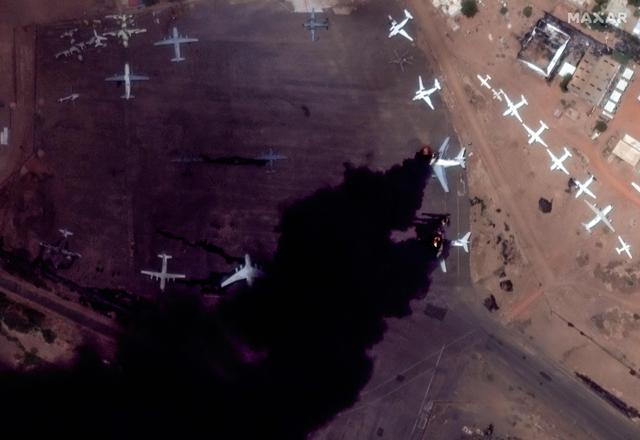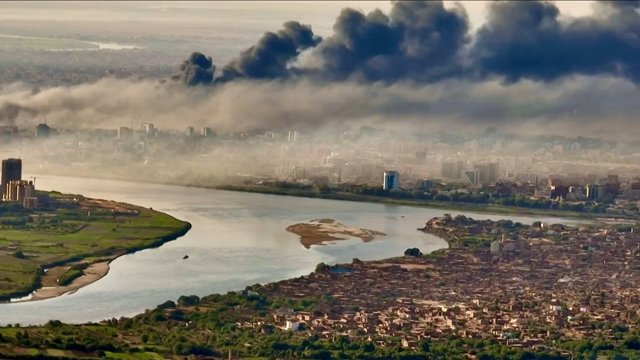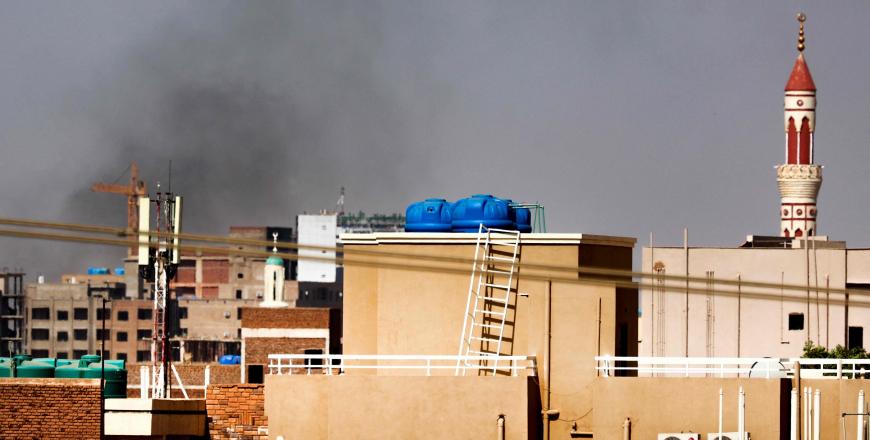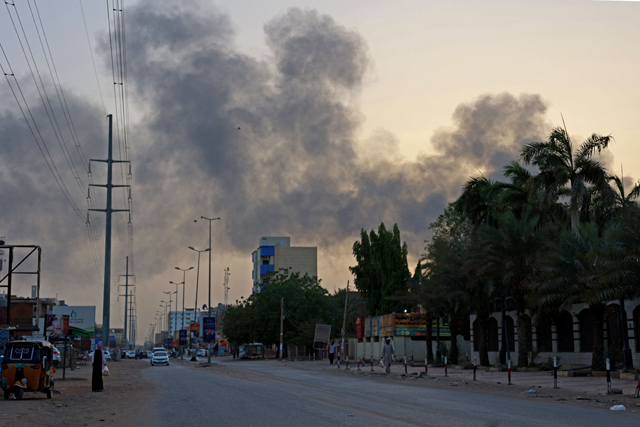You are here
Thousands flee Sudan capital as clashes rage despite truce
By AFP - Apr 20,2023 - Last updated at Apr 20,2023

This handout satellite image courtesy of Maxar Technologies taken on Sunday shows two Il-76 transport aircraft on fire and several additional planes have been damaged at the Khartoum International Airport (AFP photo)
KHARTOUM — Thousands of residents fled Sudan's capital Wednesday as fighting between the army and paramilitaries, which has killed around 200 people, raged for a fifth day after a 24-hour truce collapsed.
The violence erupted on Saturday between the forces of two generals who seized power in a 2021 coup: Army chief Abdel Fattah al-Burhan and his deputy, Mohamed Hamdan Daglo, who commands the paramilitary Rapid Support Forces (RSF).
It followed a bitter dispute between them over the planned integration of the RSF into the regular army — a key condition for a final deal aimed at restoring Sudan's democratic transition.
Deafening explosions rattled buildings and heavy gunfire were heard in Khartoum, as witnesses said plumes of thick black smoke emanated from buildings around the army headquarters in central Khartoum.
RSF fighters atop armoured vehicles and pick-up trucks laden with heavy weapons swarmed the streets, as the army's fighter jets roared overhead and fired on RSF targets, the witnesses said.
Civilians huddled in their homes were becoming increasingly desperate, with dwindling food supplies, power outages, and a lack of running water.
Their hopes of being evacuated were dashed when a 24-hour humanitarian ceasefire collapsed within minutes of its proposed start at 1600 GMT on Tuesday.
Thousands of people took matters into their own hands and, according to witnesses, began leaving their homes in Khartoum, some in cars and others on foot, including women and children.
They said the streets were littered with dead bodies, the stench of which filled the air.
The fighting has killed at least 185 people and injured more than 1,800, according to the United Nations.
But the real figure is thought to be far higher with many wounded unable to reach hospitals, which are themselves being shelled, according to the official doctors' union.
Governments have starting planning to evacuate thousands of foreigners stuck in the country, among them many UN staff.
Japan said its defence ministry had begun the “necessary preparations” to evacuate around 60 of its nationals from Sudan, including embassy staff.
The US embassy in Khartoum said it started gathering citizens’ personal details while urging them to remain indoors and stay away from windows.
“Due to the uncertain security situation in Khartoum and closure of the airport, there are no plans for [a] US government-coordinated evacuation,” it tweeted.
The violence has also seen a US diplomatic convoy fired upon, the European Union’s ambassador attacked at home and a Belgian humanitarian official with the EU hospitalised after reportedly being shot.
On Tuesday, United Nations emergency relief coordinator Martin Griffiths said the UN had received “reports of attacks and sexual violence against aid workers”.
Aid groups have reported looting of medical and other supplies.
After the collapse of the truce, the army accused the “rebel militia” of failing to commit to it and of continuing “skirmishes around the army headquarters and the airport”.
The RSF pointed the finger at the army for “committing violations” and breaching the ceasefire by launching “sporadic attacks” on its forces and bases around the capital.
International
actors ‘bide time’
The latest violence, during the Muslim fasting month of Ramadan, came after more than 120 civilians had already been killed in a crackdown on regular pro-democracy demonstrations over the past 18 months.
Both generals have positioned themselves as saviours of Sudan and guardians of democracy, in a country which has known only brief democratic interludes.
Since the start of fighting, each side has claimed the upper hand and that they have taken control of key sites or made advances on the other’s bases across Sudan.
None of the claims could be independently verified.
“Neither side seems to be winning at the moment, and given the intensity of the violence, things could get even worse before the two generals come to the negotiating table,” said Clement Deshayes, a Sudan specialist at Paris’s Sorbonne University.
But that would necessitate “regional allies exerting pressure, and right now their declarations aren’t heading in that direction, with international actors seemingly biding their time until the situation is clearer”.
Saturday’s outbreak of violence is the culmination of deep-seated divisions between the army and the RSF, which was created in 2013 by longtime autocrat Omar Al Bashir.
Burhan and Daglo toppled Bashir together in April 2019 following mass protests against his three decades of iron-fisted rule.
They have since been allies with their relationship interspersed with brief periods of tensions.
In October 2021, the pair led a military coup against the civilian government, which was installed following Bashir’s ouster, derailing an internationally backed transition.
Burhan, a career soldier from northern Sudan who rose the through ranks under Bashir, has maintained his coup was “necessary” to include more factions into politics.
But Daglo, also known as Hemeti, has since called the coup a “mistake” that failed to bring about change and invigorated Bashir’s remnants.
Related Articles
KHARTOUM — Explosions and gunfire resounded in Sudan's capital Thursday as fighting between the forces of two rival generals showed no signs
KHARTOUM -- Fighting in Sudan's capital entered a second week on Saturday as crackling gunfire shattered a temporary truce, t
KHARTOUM — Explosions rocked the Sudanese capital Khartoum Monday as fighting between the army and paramilitary forces led by rival generals














